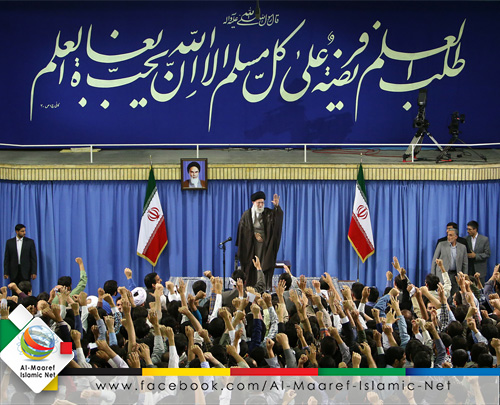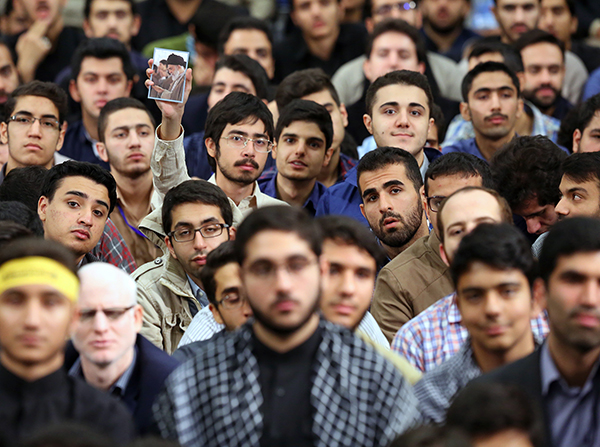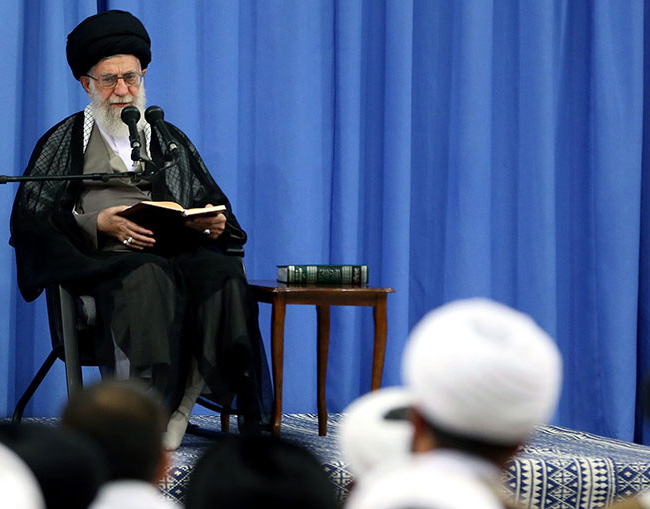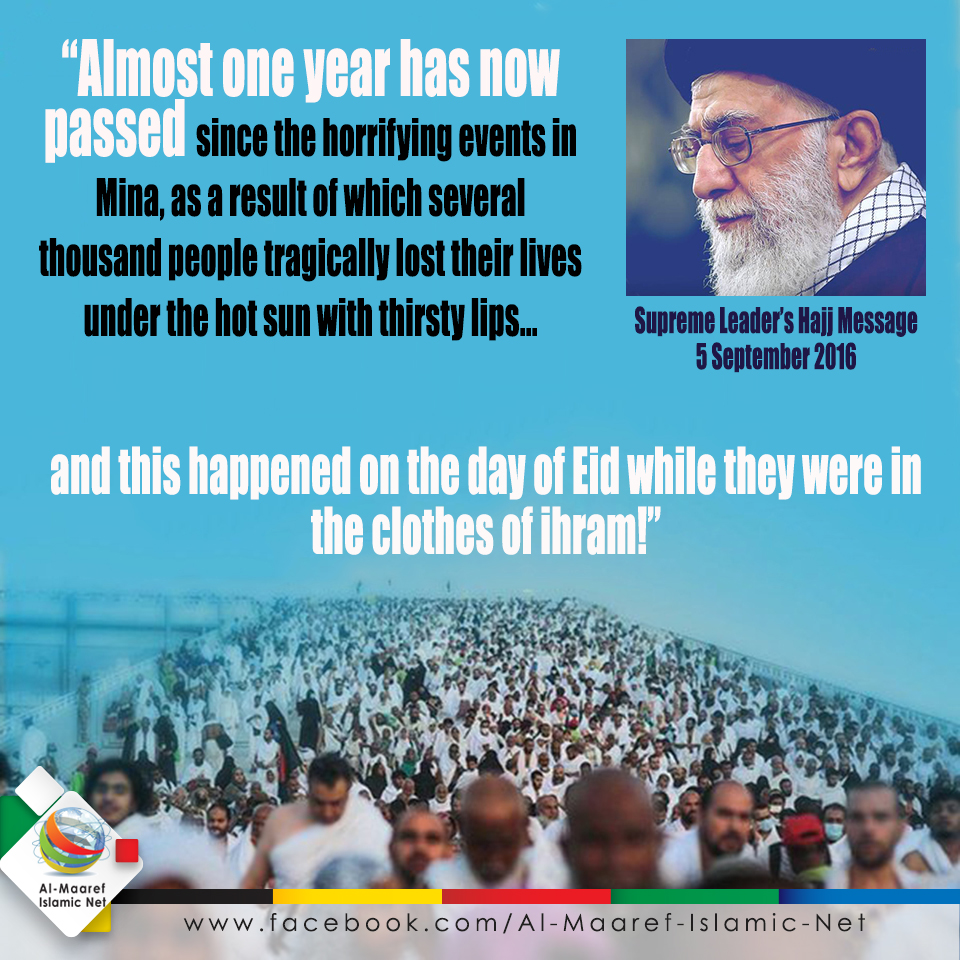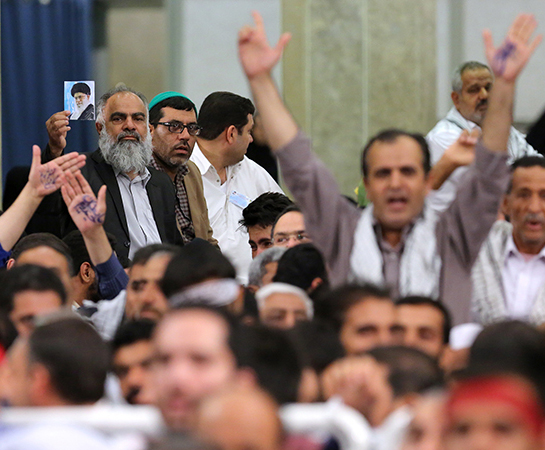Supreme Leader's Meeting with University Students 11 July, 2015
Sayyed Ali Khamenei had a meeting on Saturday, the eleventh of July with more than one thousand students. This meeting took about four hours and the Leader listened to the concerns of the students and their demands, criticism and proposals. He spoke with them about different issues including idealism, requirements for boosting the influence of student organizations, regional issues, the Iranian nation’s persistent fight against world arrogance, and everyday issues of students.
In what follows are a few extracts of the Supreme Leader's speech.
“In this spring of spirituality and purity, anybody who lets his heart be influenced by the rain of divine mercy and favor, will benefit from the fruits of this spiritual sowing in the future.”
In response to a question frequently asked by youths about ways of spiritual exaltation, Ayatollah Khamenei said, “I heard from [great] scholars that the most important work for spiritual exaltation is piety and refraining from [committing] sins.”
Ayatollah Khamenei said performing religious obligations particularly “on-time prayers with suitable attention [to its content] and preferably in congregation” is complementary to refraining from sins, adding, “Adorn this valuable collection by reciting at least a few verses from the [holy] Quran every day.”
After underscoring the importance of fulfilling religious obligations, the Leader went on to discuss student obligations.
Ayatollah Khamenei described students as a unique social stratum, noting, “The most important student obligation is idealism.”
Dismissing a thought which considers idealism as contrary to realism, the Leader said, “Idealism is opposed to conservatism, not realism.”
Further explaining himself, the Leader said conservatism means submission to any reality, adding, “Idealism means correctly using positive realities and fighting negative realities with a view to reaching big objectives.”
Ayatollah Khamenei said, “Establishment of an Islamic society and revival of the notion of political Islam” were among the most important ideals, adding, “The ideal of self-confidence and belief in [the idea that] ‘We Can’ is decisively influential on the growth and exaltation of the society and the country.”
Fighting the hegemonic system and [world] arrogance was the third ideal that Ayatollah Khamenei discussed within the framework of the obligations of the student community.
The Leader mentioned “justice-seeking,” “Islamic lifestyle,” “realistic and not Western-style freedom-seeking,” “scientific growth,” “work, endeavor and refraining from laziness,” and “Islamization of universities” as other manifestations of idealism [to be followed] by student organizations.
After elucidating the mechanism of the influence of student organizations on decision-making by different organs in the country, the Leader highlighted requirements to which student organizations should remain committed.
Ayatollah Khamenei said refraining from “superficiality and profound work on Islamic concepts” are the first requirements for the student organizations.
To that effect, the Leader criticized certain slogans and remarks, which are apparently Islamic but interiorly different.
As an example, Ayatollah Khamenei said, “The term of ‘merciful Islam’, which has become common these days, has been formed through the combination of two beautiful words. But what’s its real meaning? Does it mean that despite the Quran dividing humans into pious and infidel, [as well as] foe and friend, all humans should be treated with mercy? [Does it mean that] those who are hostile to Islam and the Iranian nation should be treated with kindness, friendship and justice, against God's order?”
Ayatollah Khamenei said increased attention to the ideals and the failure of efforts by certain groups to marginalize and eliminate the ideals of Imam Khomeini, are among the significant realities in the country.
The Leader noted that following the demise of the late Imam Khomeini, some people inadvertently revealed their hidden goals to marginalize the great ideals of the Imam, and of course, they have become more mature now and no longer speak openly about this goal, though they still strive toward it.
Ayatollah Khamenei said, “Despite incessant efforts by this group inside and outside the country and recruitment of intellectual, political and artistic elements, the ideals have become more lively and dynamic in the country and even youths who had not witnessed the attractive realities of the Imam’s lifetime and the Imposed War (Iraqi war on Iran from 1980 to 1988), have wholeheartedly been attracted by the ideals of Islam and the [1979 Islamic] Revolution.”
Like Martyr Beheshti (Ayatollah Seyed Mohammad Beheshti, the first judiciary chief of Iran), we tell the enemies of this nation to die from anger and frustration.
In response to a question by one of the students about remarks by some representatives and appointees of the Leader, who try to pass their views as those of the Leader, Ayatollah Khamenei said, “What they say is their words, and you hear my words from me in person.”
Another question by one of the students was about the process of fighting arrogance after nuclear talks. In response, Ayatollah Khamenei said, “The fight against arrogance and hegemonic system, based on Quranic principles, will never stop, and today the US is the most complete example of arrogance.”
“The fight against arrogance is among the principles of the revolution and is a main activity, [and] therefore, prepare yourselves to continue the fight against arrogance,” added the Leader.


